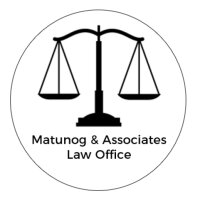Best Arrests & Searches Lawyers in Davao City
Share your needs with us, get contacted by law firms.
Free. Takes 2 min.
List of the best lawyers in Davao City, Philippines
About Arrests & Searches Law in Davao City, Philippines
Davao City, located in the Philippines, follows the national laws regarding Arrests & Searches. These laws aim to maintain public safety and order, while protecting the rights of individuals during any legal operation. Understanding the legal framework is crucial to protect your rights and ensure a fair process in cases of arrests and searches.
Why You May Need a Lawyer
There are several situations where it is advisable to seek legal assistance in matters related to Arrests & Searches:
- If you have been arrested and need guidance on your rights and legal options.
- If a search has been conducted at your premises, and you want to ensure it was done in accordance with the law.
- If you believe your rights have been violated during an arrest or search.
- If you need help understanding the legal process, including filing complaints or seeking redress.
- If you are facing charges as a result of an arrest or search and need expert representation.
Local Laws Overview
In Davao City, the following local laws are particularly relevant to Arrests & Searches:
- Republic Act No. 7438: This law protects the rights of persons arrested, detained, or under custodial investigation. It outlines the rights of individuals, such as the right to be informed of the reason for arrest and the right to remain silent.
- Republic Act No. 9165: This law specifically deals with offenses related to illegal drugs. It governs the arrest, search, and seizure process in drug-related cases.
- The Revised Penal Code: This law defines crimes and outlines procedures for arrest and search in all types of criminal cases.
Frequently Asked Questions
1. Can the police arrest me without a warrant?
Yes, the police can arrest you without a warrant if they have reasonable ground to believe that you have committed, are committing, or are about to commit a crime, or if the offense is committed in their presence.
2. What should I do if I am arrested?
If you are arrested, it is important to remain calm and cooperative. You have the right to be informed of the reason for your arrest, and you also have the right to remain silent. It is advisable to request legal representation and avoid answering any questions without the presence of a lawyer.
3. Can the police search my property without a warrant?
In some cases, the police can conduct a search without a warrant. This includes situations where there is probable cause that a crime has been committed, or if there are "exigent circumstances" where there is a risk of immediate danger or destruction of evidence.
4. What should I do if my rights are violated during an arrest or search?
If you believe your rights have been violated during an arrest or search, it is important to gather evidence and document the incident. Then, contact a lawyer to discuss your options and file a complaint if necessary.
5. What should I expect during a search of my property?
During a search, the police must clearly explain the reason for the search and present a copy of the search warrant, if applicable. They should conduct the search in your presence or in the presence of a representative. It is recommended to take note of the officers involved and any items seized during the search.
Additional Resources
For more information and legal advice related to Arrests & Searches in Davao City, you may find these resources helpful:
- Davao City Hall - Legal Services Division
- Integrated Bar of the Philippines - Davao City Chapter
Next Steps
If you require legal assistance regarding Arrests & Searches in Davao City, it is recommended to:
- Contact a reputable lawyer specializing in criminal law.
- Explain your situation in detail and provide any relevant documentation.
- Follow your lawyer's advice and guidance throughout the legal process.
- Stay informed about your rights and obligations to ensure a fair resolution.
Lawzana helps you find the best lawyers and law firms in Davao City through a curated and pre-screened list of qualified legal professionals. Our platform offers rankings and detailed profiles of attorneys and law firms, allowing you to compare based on practice areas, including Arrests & Searches, experience, and client feedback.
Each profile includes a description of the firm's areas of practice, client reviews, team members and partners, year of establishment, spoken languages, office locations, contact information, social media presence, and any published articles or resources. Most firms on our platform speak English and are experienced in both local and international legal matters.
Get a quote from top-rated law firms in Davao City, Philippines — quickly, securely, and without unnecessary hassle.
Disclaimer:
The information provided on this page is for general informational purposes only and does not constitute legal advice. While we strive to ensure the accuracy and relevance of the content, legal information may change over time, and interpretations of the law can vary. You should always consult with a qualified legal professional for advice specific to your situation.
We disclaim all liability for actions taken or not taken based on the content of this page. If you believe any information is incorrect or outdated, please contact us, and we will review and update it where appropriate.










